Freshers Guide 2025
Here is almost everything you need to know for you first weeks.
July 15, 2025, by

Table of Contents
- Welcome to the University of Mannheim
- What does the Fachschaft do?
- Freshers’ Week Schedules
- Registration for the Freshers’ Weekend
- General Information
- Information on the Bachelor Political Science
- Information on the Bachelor Sociology
- Important Contact Points
Welcome to the University of Mannheim
We, the members of the Departmental Student Council for Sociology and Political Science (Fachschaft SoPo), warmly welcome you to the University of Mannheim.
With your studies at the Faculty of Social Sciences, something new begins, whether you are a first-year student or changing subjects. We want to support you in this new beginning!
To give you a first point of reference for your studies, we have put together this Freshers’ Guide for you. We want to take away some of the fear and uncertainty of the initial phase. With this guide, we try to offer initial guidance. And for everything else: just ask us, because that’s what we’re here for.
So enjoy your first days as “Erstis” in our beautiful “A5” and around the university. We wish you a lot of fun, luck, and success with your studies!
You can find a lot more information on our Instagram page. To directly connect with your new fellow students, we have created study-specific WhatsApp groups for you:
Alternatively, you can also find the QR codes to join in Portal2 via our welcome message.
What does the Fachschaft do?
The Fachschaft is an association of committed students from all study programs of the faculty (B.A. and M.A. Politikwissenschaft, B.A. and M.A. Soziologie, Bachelor of Education), excluding Psychology. In roughly, our work is comparable to the student council at schools, because we are all still students ourselves. Broadly speaking, we are the student representation at the faculty level. The Fachschaft is one of many university committees. We volunteer our time to advocate for the interests of students:
Organization
As Fachschaft, we organize for you excursions (e.g., to Bonn and Berlin), lectures, information events, and “Schneckenhoffeten”.
Representation
We are your central contact point for problems and questions. We serve as the link between students and professors or the faculty management. In this function, we are in constant exchange with the Dean’s Office and study program management.
Committee Work
In addition to the elected Fachbereichsvertretung, our representatives sit for you on the Fakultätsrat (conference of professors, the dean, and students of the Faculty of Social Sciences), the Fachschaftsrat (cross-faculty student council committee), and the Studienkommission (pre-committee of the Fakultätsrat).
Participation
Do you also want to contribute to shaping university life? During lecture periods, we meet every Tuesday at 7 PM in a seminar room. The kick-off Fachschaft meeting this semester will take place on September 9th at 7 PM. The room will be announced later. We are an open Fachschaft, everyone is invited to join us. So if you’re interested, just drop by!
Freshers’ Week Schedules
Please note the schedule for your respective study program (PoWi/Sozi/Bachelor/Master/Lehramt).
Bachelor Politikwissenschaft
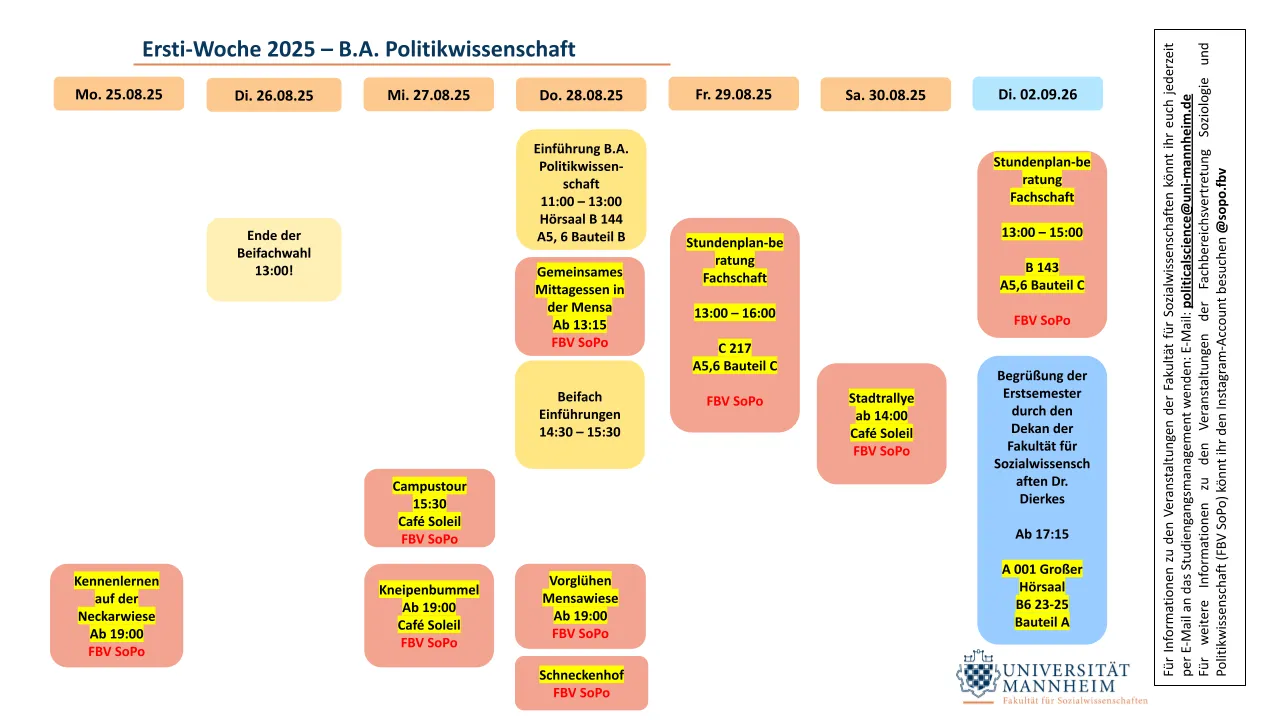 Schedule Bachelor PoWi
Schedule Bachelor PoWi
Bachelor Soziologie
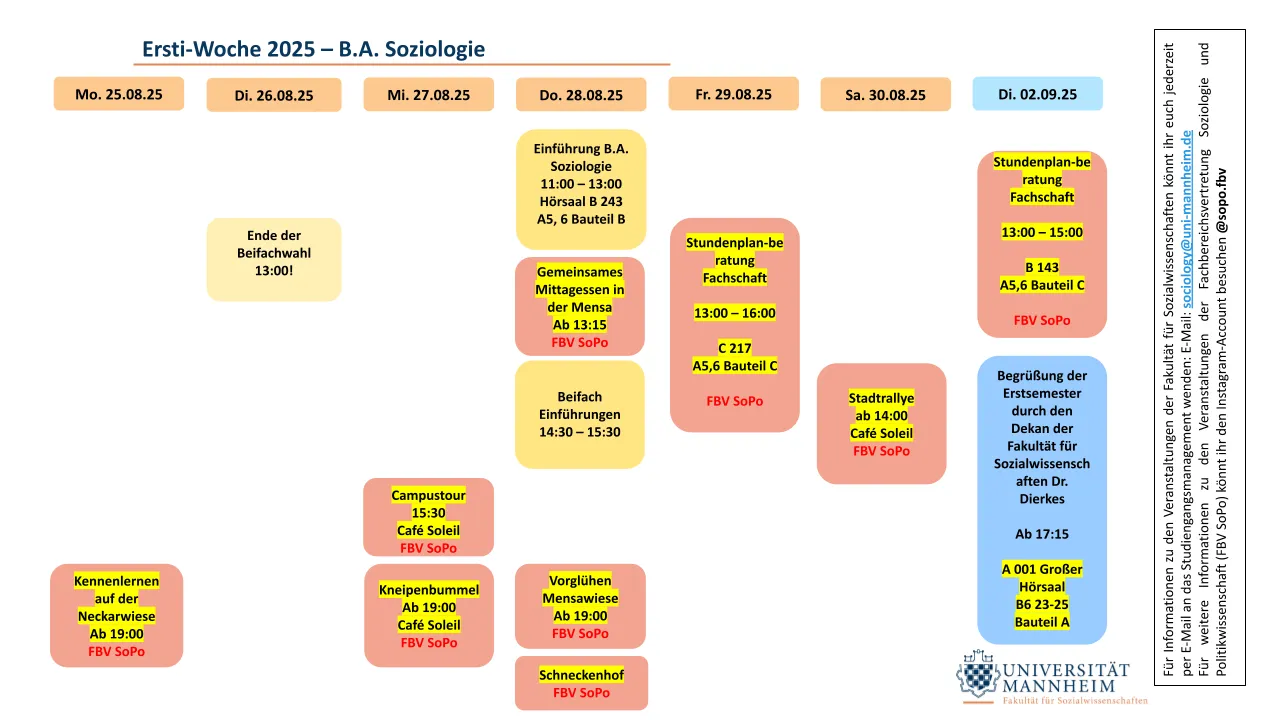 Schedule Bachelor Sozi
Schedule Bachelor Sozi
Bachelor of Education (PoWi)
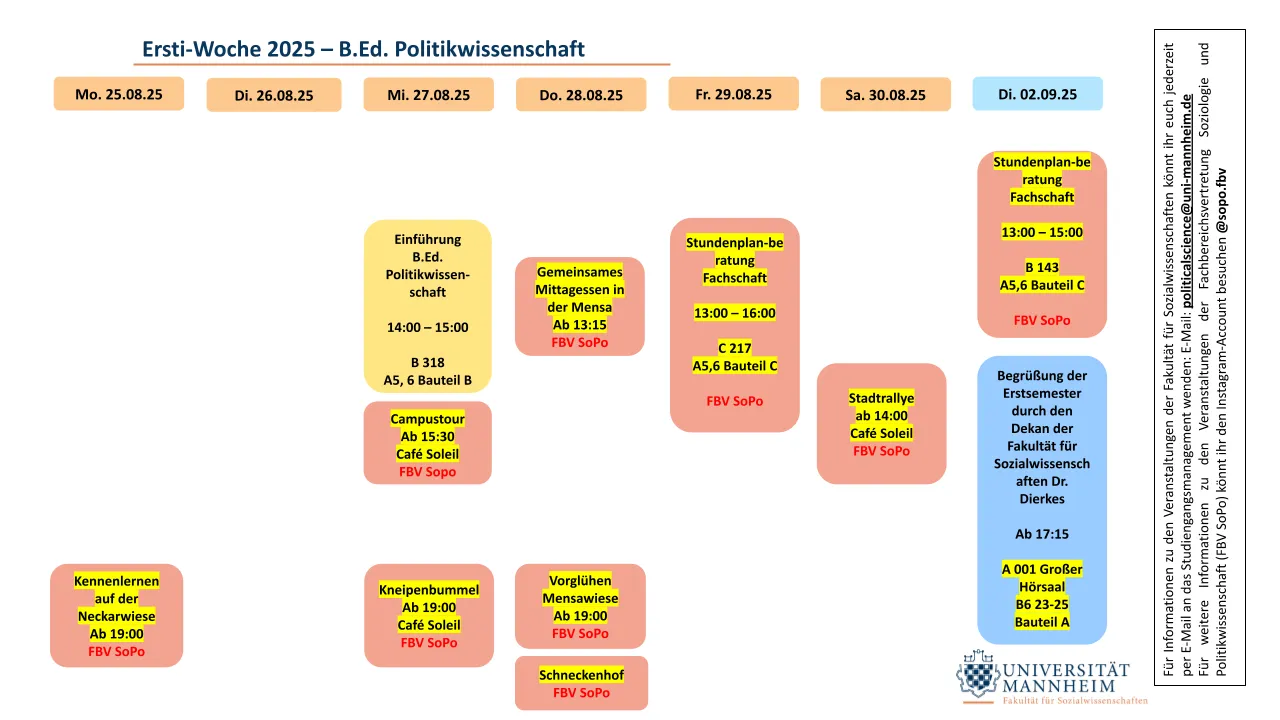 Schedule PoWi Lehramt
Schedule PoWi Lehramt
Master Politikwissenschaft
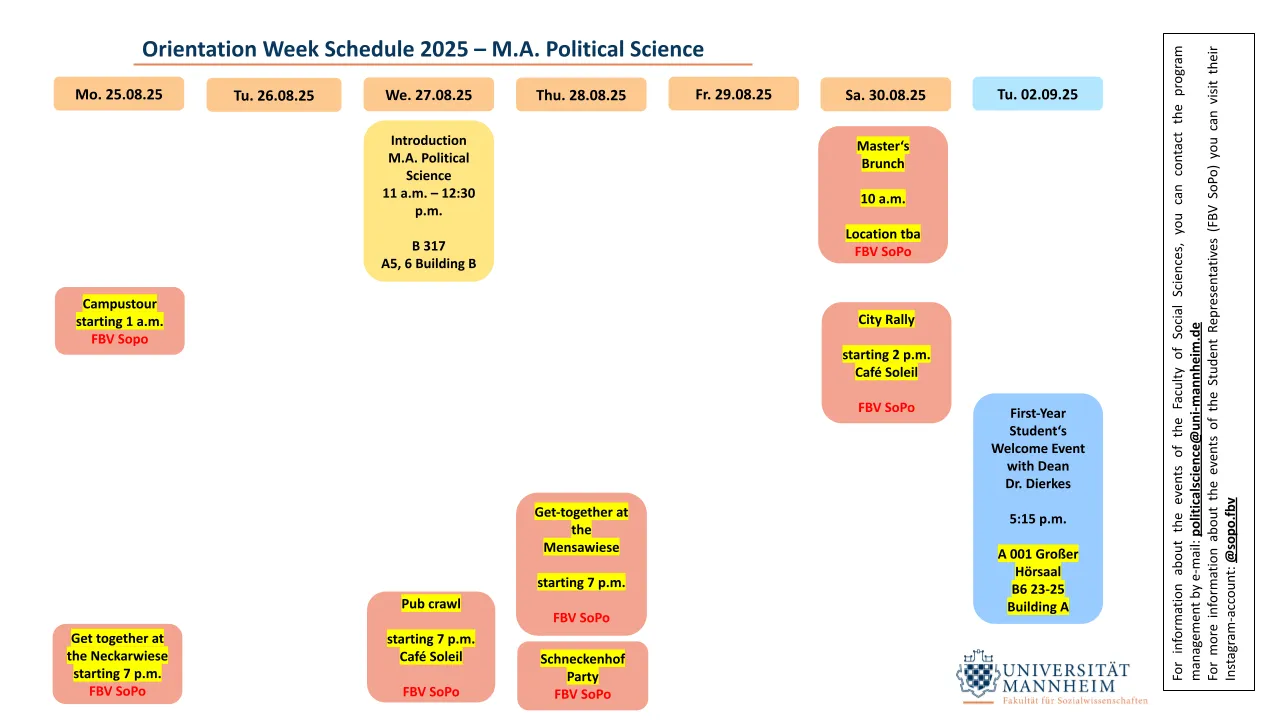 Schedule Master PoWi
Schedule Master PoWi
Master Soziologie
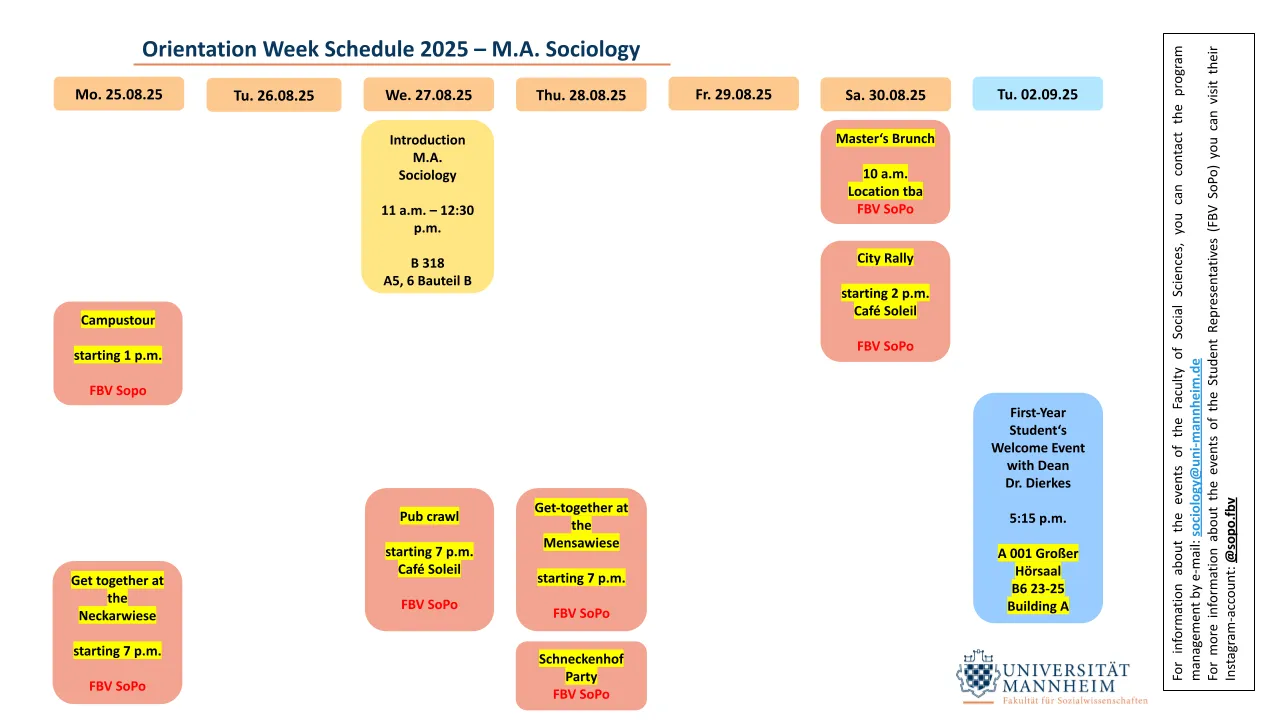 Schedule Master Sozi
Schedule Master Sozi
Registration for the Freshers’ Weekend
We are very pleased to be able to offer a get-to-know-you weekend again this semester. Information regarding the date and registration will follow by early September at the latest. We strongly recommend that you follow us on Instagram, where you will receive the most reliable updates.
General Information
ecUM
The ecUM is your student ID, library card, semester ticket, copy card, and money card in the Mensa all in one. So definitely don’t lose it!
Mandatory Study Counseling (Pflichtstudienberatung)
Mandatory study counseling takes place in the first and third semesters. It is conducted by our study program manager Florian Dorner.
Examinations
Your exams and other study-accompanying examinations usually take place at the beginning of the lecture-free period, and the re-examinations are then approximately in the last week before the semester begins (week zero).
Approx. 4–6 weeks before the examinations, you must register for the exam performance in Portal 2 so that the courses are credited to you.
You have the choice of whether you want to take the first attempt or the second attempt (retake). To the exams, you must not forget your student ID (ecUM) and personal ID.
An exam is considered failed if you do not appear or withdraw without reason after the start of the examination. In case of illness, a medical certificate must be submitted in writing. You can withdraw from an exam in the Portal up to three days before the respective examination date without giving a valid reason.
If you fail an exam/Klausur, you are automatically registered for the retake.
If you do not pass a study-accompanying examination, it can be repeated once; in the entire course of study, a second repetition of an examination can be made in a maximum of three cases (except for elements of the Orientierungsprüfung, these can generally be repeated once!).
Grade Improvement
Once in the entire course of study, an attempt can be made to improve the grade of a passed examination performance. However, this only applies to the core subject. In the end, the better of the two grades counts.
Parties (Feten)
Every Thursday, parties (“Schneckenhofpartys”) are held at the university, organized by the Fachschaften or the AStA. We SoPos also celebrate a party together with the MKW.
University Library (Unibibliothek)
Not only our Fachschaft is located in A5, but also our library at entrance C. Here you can print and scan. If you want to borrow books, you can do so in the main university library in the East Wing of the Schloss. The Lehrbuchsammlung in the West Wing offers a large number of textbooks specifically for loan.
Initiatives
At our university, there are many opportunities to get involved alongside your studies. A list of all initiatives can be found on the AStA homepage.
Studium Generale
The marketing company of the University of Mannheim “UMSUM GmbH” offers language, rhetoric, and IT courses. Programs are available throughout the university. On the Studium Generale website, you can find out more about the courses and costs and register for the courses.
Information on the Bachelor Political Science
What does the study program include, which subjects must be taken?
The Political Science program consists of three core areas: Vergleichende Regierungslehre (VR - Comparative Government), Internationale Beziehungen (IB - International Relations), and Politische Soziologie (PS - Political Sociology). Every student is required to take a minor subject (“Beifach”). A detailed list of minor subjects can be found on the following pages.
Furthermore, you must take two courses to acquire “Schlüsselqualifikationen” (Social Skills). For example, presentation and communication techniques, media practice, deepening of foreign languages, or IT skills can be acquired. Finally, a mandatory internship ensures that practical application is not neglected alongside theoretical knowledge. This mandatory internship is part of your Praxismodul, which you also must complete. In addition to the internship, you must complete the “Sozialwissenschaften und Praxis” module and attend the accompanying events during your studies. In the sixth semester, the B.A. Political Science program is concluded by writing a final thesis.
What kind of courses are there in the basic study period (Grundstudium)?
Vorlesung (Lecture): A form of instruction in which lecturers or professors present the material to students in a series of events. Scripts are usually uploaded, which are further deepened by the professor’s lecture. Lectures usually conclude with an exam at the end of the semester.
Übungskurs (Exercise Course): An exercise course is to be attended as a deepening of the lecture. There, the topics presented in the lecture are discussed using additional literature, and there is more time for questions. The exercises are mostly held by research assistants of the respective chair. Weekly homework, presentations, and oral participation serve as proof of performance.
Tutorium (Tutorial): Participation is (mostly) voluntary. Students from higher semesters lead the courses and offer you the opportunity to repeat and practice difficult aspects of the lecture.
Proseminar (Introductory Seminar): In the Proseminare, you learn scientific work using concrete examples. The seminars are held by staff members of the chair. Mostly, they are concluded with a term paper or an essay in which you have to independently answer a scientific question.
How is the basic structure of the study program designed?
Of the total 180 ECTS points of the entire study program, approximately 125 are allocated to the core subject and at least 32 to the minor subject. Furthermore, you must obtain 6 ECTS through Social Skills modules and 17 ECTS through the Praxismodul. Below is a study plan for the basic study period (first three semesters), which you can use for orientation. This plan is stipulated by the examination regulations. A detailed study plan (including the required proofs of performance) can be found in the “B.A. Politikwissenschaft” study plans.
| SEM. | CORE SUBJECT | SUPPLEMENTARY AREA |
|---|---|---|
| 1 | Basismodul Einführung in die Politikwissenschaft (Introductory Module Political Science): VL Einführung Politikwissenschaft VL Einführung in das pol. System der BRD VL Wissenschaftliches Arbeiten Basismodul Methoden und Statistik (Methods and Statistics Module): VL Empirische Methoden der Politikwissenschaft | Pflichtstudienberatung I |
| 2 | Basismodul Vergleichende Regierungslehre (VR - Comparative Government Module): VL Einführung VR ProS Einführung VR Basismodul Methoden und Statistik (Methods and Statistics Module): VL Datenauswertung ÜK Datenauswertung | VL Sozialwissenschaften und Praxis (Social Sciences and Practice Lecture) (can be taken from 1st to 3rd semester) |
| 3 | Basismodul Internationale Beziehungen (IB - International Relations Module): VL Einführung IB ProS Einführung IB Basismodul Politische Soziologie (PS - Political Sociology Module): VL Einführung PS ProS Einführung PS | Pflichtstudienberatung II |
After the third semester, two of the three offered advanced modules (“Aufbaumodule”) must be chosen (IB, PS or VR). In both advanced modules, VL, ÜK, and two Hauptseminare must be attended!
What is an Orientierungsprüfung (Orientation Examination)?
You have to take an Orientierungsprüfung: This means you must submit two proofs of performance by the end of the third semester. These include the lecture: “Einführung in die Politikwissenschaft” and “Empirische Methoden der Politikwissenschaft” (EPR). If you have not managed this by the end of the third semester, your examination claim expires, and you will be exmatriculated. This also means for you: You can no longer study Political Science in Baden-Württemberg. For admission to the corresponding advanced modules, you must have passed the respective basic module.
Minor Subjects (Beifächer)
The minor subject should have a total scope of at least 32 ECTS. The following minor subjects can be chosen:
- Soziologie (Sociology)
- Psychologie (Psychology)
- BWL (Business Administration)
- VWL (Economics)
- Öffentliches Recht (Public Law)
- Mathematik (Mathematics)
- Angewandte Informatik (Applied Computer Science)
- Anglistik/Amerikanistik (English/American Studies)
- Philosophie (Philosophy)
- Germanistik (German Studies)
- Geschichte (History)
- Medien-und Kommunikationswissenschaft (Media and Communication Studies)
- Romanistik: Französisch (Romance Studies: French)
- Romanistik: Italienisch (Romance Studies: Italian)
- Romanistik: Spanisch (Romance Studies: Spanish)
Information on the study plan and the study plans of the respective minor subjects can be found on the Sowi-Fakultät website.
Information on the Bachelor Soziologie
How is the basic structure of the study program designed?
Of the total 180 ECTS points of the entire study program, approximately 125 are allocated to the core subject and at least 32 to the minor subject. Furthermore, you must obtain 6 ECTS through Social Skills modules and 17 ECTS through the Praxismodul. Below is a study plan for the basic study period (first three semesters), which you can use for orientation. This plan is stipulated by the examination regulations. A detailed study plan (including the required proofs of performance) can be found in the “B.A. Soziologie” study plans.
| SEM. | CORE SUBJECT | SUPPLEMENTARY AREA |
|---|---|---|
| 1 | Basismodul Soziologie I (Sociology Module I): VL Grundlagen der Soziologie ÜK Grundlagen der Soziologie Basismodul Methoden und Statistik (Methods and Statistics Module): VL Datenerhebung ÜK Datenerhebung | Pflichtstudienberatung I |
| 2 | Basismodul Sozialpsychologie (Social Psychology Module): VL Sozialpsychologie ÜK Sozialpsychologie Basismodul Methoden und Statistik (Methods and Statistics Module): VL Datenanalyse ÜK Datenanalyse | VL Sozialwissenschaften und Praxis (Social Sciences and Practice Lecture) (can be taken from 1st to 3rd semester) |
| 3 | Basismodul Soziologie II (Sociology Module II): VL Sozialstruktur Deutschlands im internationalen Vergleich ÜK Sozialstruktur Deutschlands im internationalen Vergleich ProS Soziologie Basismodul Methoden und Statistik (Methods and Statistics Module): VL Multivariate Verfahren ÜK Multivariate Verfahren | Pflichtstudienberatung II |
After the third semester, three of the four offered advanced modules (“Aufbaumodule”) must be chosen (“Allgemeine und Spezielle Soziologie”, “Europäische Gesellschaften im Vergleich”, “Methoden der empirischen Sozialforschung” and “Sozialpsychologie”).
What is an Orientierungsprüfung (Orientation Examination)?
You have to take an Orientierungsprüfung: This means you must submit three proofs of performance by the end of the second semester. These include the lectures: “Grundlagen der Soziologie”, “Datenerhebung”, and “Sozialpsychologie”. If you have not managed this by the end of the third semester, your examination claim expires, and you will be exmatriculated. This also means for you: You can no longer study Sociology in Baden-Württemberg. For admission to the corresponding advanced modules, you must have passed the respective basic module.
Minor Subjects (Beifächer)
The minor subject should have a total scope of at least 32 ECTS. The following minor subjects can be chosen:
- Politikwissenschaft (Political Science)
- Psychologie (Psychology)
- BWL (Business Administration)
- VWL (Economics)
- Öffentliches Recht (Public Law)
- Mathematik (Mathematics)
- Angewandte Informatik (Applied Computer Science)
- Anglistik/Amerikanistik (English/American Studies)
- Philosophie (Philosophy)
- Germanistik (German Studies)
- Geschichte (History)
- Medien- und Kommunikationswissenschaft (Media and Communication Studies)
- Romanistik: Französisch, Italienisch oder Spanisch (Romance Studies: French, Italian, or Spanish).
Information on the study plan and the study plans of the respective minor subjects can be found on the Sowi-Fakultät website.
Important Contact Points
Studiengangsmanagement (Study Program Management)
Here you will find your respective contact persons in the Studiengangsmanagement.
Studierendenwerk Mannheim (Student Services Mannheim)
The Studierendenwerk Mannheim offers a wide range of services, under other things:
- Food + Drink
- Housing
- BAföG Counseling
- Psychological Counseling
- and much more
AStA Gleichstellungsreferat (AStA Gender Equality Department)
- Yagmur Yeic
- gleichstellung@asta-uni-mannheim.de